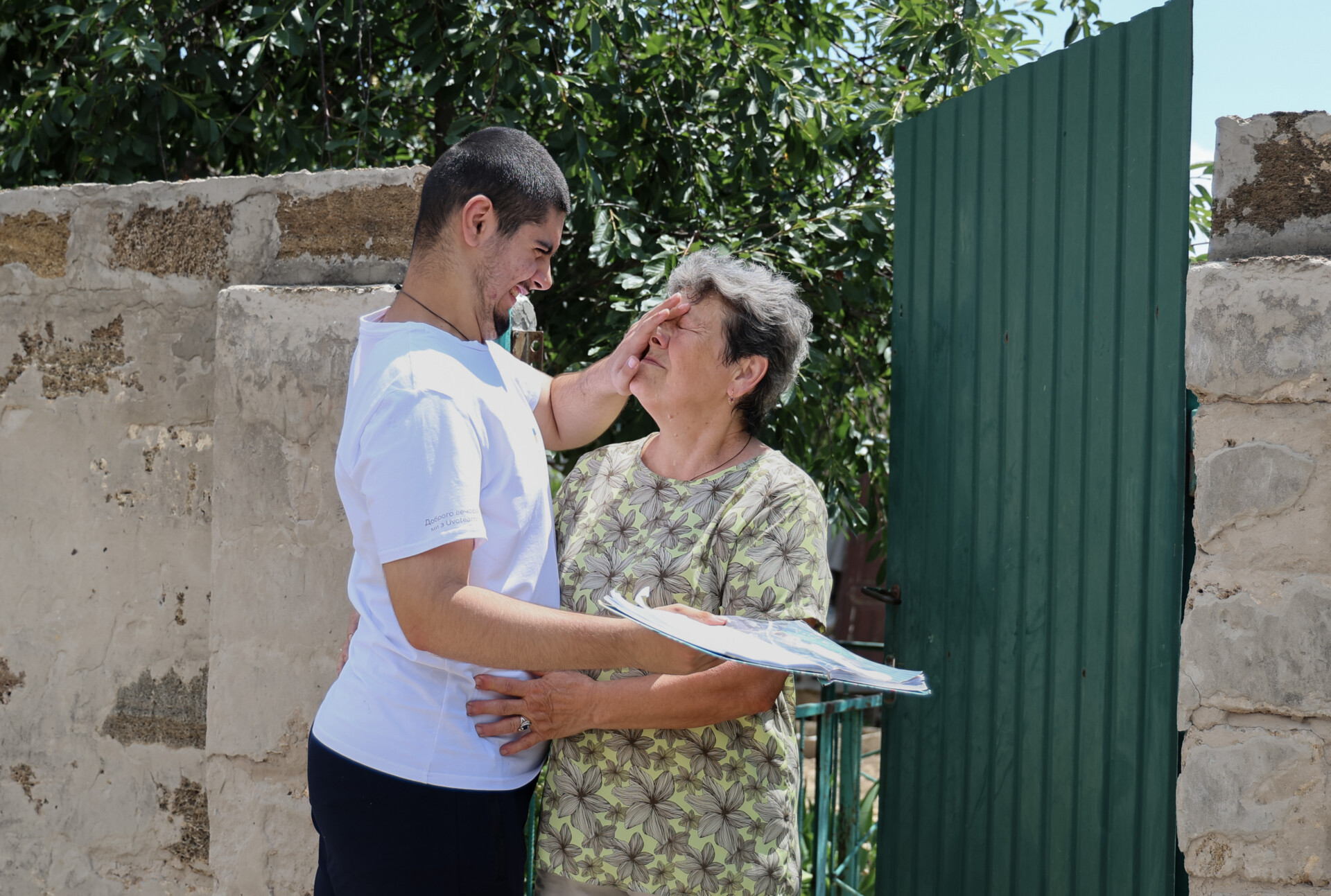At the beginning of Russia’s brutal occupation of Ukraine’s Kherson region, Hanna Zamyshliaieva took small comfort in the brief phone calls she received from the staff at the Oleshky Specialized Boarding School about her son’s well-being. Twenty-two-year-old Anton Volkovych had been diagnosed at an early age with a neurological disorder and required a wheelchair to get around and constant medical attention. The Oleshky facility, named after the small city in which it is located, was one of the best for disabled people in Ukraine, and Volkovych had thrived under its specialized care for eight years. But after February 2022, when Russia’s full-scale invasion of its neighbor began, the residents of the facility and their carers were trapped — with no way in or out.
The calls with Volkovych’s caregivers eased his family’s worries. The staff assured Zamyshliaieva that Volkovych was doing well, despite the circumstances. “They sent me photos that everything was fine, there was something to eat, it was warm, there were medicines,” Zamyshliaieva said.
She assumed the occupation would end soon. But the first spring under Russian rule passed, then summer came and went. Communication between the mother and the school started to become more difficult as Russia cut off access to Ukrainian cell towers in the occupied territories. For several weeks in the fall of 2022, Zamyshlyaieva lost contact with the school altogether.
In early November, a medical worker from Volkovych’s school reached Zamyshliaieva to tell her the Russians had taken Volkovych and transferred him to another occupied city in the region.
She was shocked. No one had asked her permission to relocate her son.
It’s been almost two years since that message, and she still does not know where Volkovych is. She blames herself for not removing her son from Oleshky. She is consumed by guilt and desperation to bring her son home.
“I don’t know what is happening to him: to what extent his brain is functioning, how they are compensating for his needs, because his blood pressure was rising even before the full-scale war,” she said.
“I don’t know if my son is alive.”
Volkovych is one of 84 disabled people, both children and adults, forcibly moved by Russia from Oleshky. In the horror of war, disabled people of all ages are among the most vulnerable. They are also, all too often, forgotten. This is partly because of the relative newness of international disability rights treaties, said Kareem Asfari, a lawyer with Guernica 37 Chambers in London and a legal analyst with The Reckoning Project. The United Nations only ratified the Convention on the Rights of Persons with Disabilities in 2006, and there have been some resistance and challenges to putting it into practice in some states. Yet the rights are clearly defined under international humanitarian law, also known as the law of war, which states that forcible transfers or deportations of “protected persons,” including the sick and disabled, are illegal, even in occupied territories. Evacuations are only permissible for urgent military reasons or civilian security, but those transferred must be returned promptly and provided adequate care. Additionally, under international human rights law, which includes the Universal Declaration of Human Rights, adopted by the U.N. in 1948, disabled persons have the right to proper health care, education and family reunification.
The Reckoning Project, with New Lines, has spent one year tracking what happened to the forcibly deported, disabled residents of the facility. We have followed the desperate attempts to bring them home and identified which Russian officials are responsible for abusing their rights.
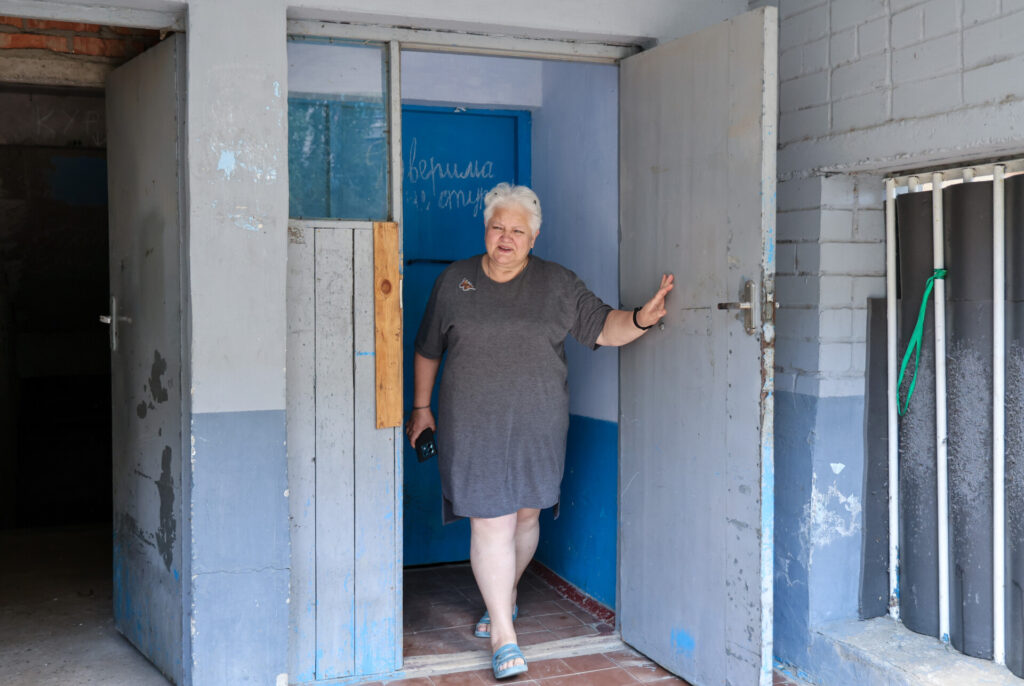
The Oleshky Children’s Boarding School had a reputation for being one of the best of its kind in Ukraine. The state-funded school accepted orphans as well as children diagnosed with varying degrees of mental and physical disabilities. Many of the children fell into both categories, but the school was known for its attentive care and specialized treatments for all its students, regardless of their status.
The doctors and educators at the orphanage prioritized socialization of its students and learning independent life skills that would allow the students to best adapt to their futures. There were frequent field trips to rivers and a nearby dolphinarium, and visits to the colorful house painted by Oleshky’s beloved folk artist Polina Raiko. There were competitions and sports training. One graduate of the orphanage, Maryna Lytovchenko, put the facility on the map when she won a gold medal in table tennis at the 2020 Summer Paralympic Games in Tokyo.
The comradery of the close-knit staff reverberated throughout the halls of the school and into the classrooms. “We always had a reason to celebrate. We did not have very high salaries, we went to work because we loved our work and our children,” said Natalka Hrabovska, a former staff member at the school.
When Russia’s full-scale invasion started on Feb. 24, 2022, the staff at the Oleshky Children’s Boarding School resorted to the facility’s basement as their best option for shelter. Under a sky flashing with the bright streaks of missile fire, they quickly got to work transporting the more than 80 students, one by one, down into the cramped space.
Most of the school’s students — orphans and children with special needs — were confined to beds or required wheelchairs or crutches to get around. Many were connected to breathing equipment or intravenous drips, all of which needed to come down to the basement with them. The hardest cases were those children with brittle bone disease, a rare genetic disorder that meant merely lifting their frail frames put them at risk of fractures and pain. An attempt to put pants on one of the boys with this diagnosis resulted in two broken legs.
“It was just a basement. A dark and damp basement for storing vegetables and old things,” said Nina Hrihorieva, a former staff member at the school. “All the children could not fit there, but it was better than in the corridor because, in the corridors, there were many windows and the glass constantly shook from the explosions. The children were scared.”
As the school’s residents sheltered in its basement, Russia’s invading army swept into Oleshky and the surrounding regions of Ukraine’s southern flank. Within a few weeks, Moscow’s forces captured and occupied almost 90% of the Kherson region, including its eponymous regional capital and major port city.
Fighting around the Antonivsky Bridge, the region’s main transportation link between the left and right banks of the Dnipro, made travel north out of Oleshky too dangerous. The window for safely evacuating the school closed quickly.
The school staff who stayed after Feb. 24 — about 100 of the 178 who were employed before the invasion — were left to care for the children with dwindling food and medical supplies. Russian shelling had destroyed the city’s gas lines but, luckily, the school’s kitchen was equipped with electric stoves for cooking. Without gas to run the orphanage’s boiler, the staff did their best to heat the facility with electric heaters to ward off the winter temperatures.
The staff at the Oleshky school watched in fear as the Russian occupying forces began swiftly implementing administrative control over social institutions, primarily targeting the spheres of education, health care and social security.
Russian military officials, sometimes in plain clothing, other times in uniforms with automatic rifles, attempted several times to get the Oleshky school to “cooperate” with the occupying forces. Sometimes, they made surprise visits, offering donations of food in exchange for information, such as the whereabouts and headcounts of the children.
“From the beginning of the occupation, there were constant rumors among employees that Ukraine was evacuating us. But all efforts failed at the planning stage,” said Vadym Reutsky, a teacher and sports coach at the school who stayed for the first months of the occupation.
Everyone understood that it was only a matter of time before Russia would come to seize full control of the school, he said.
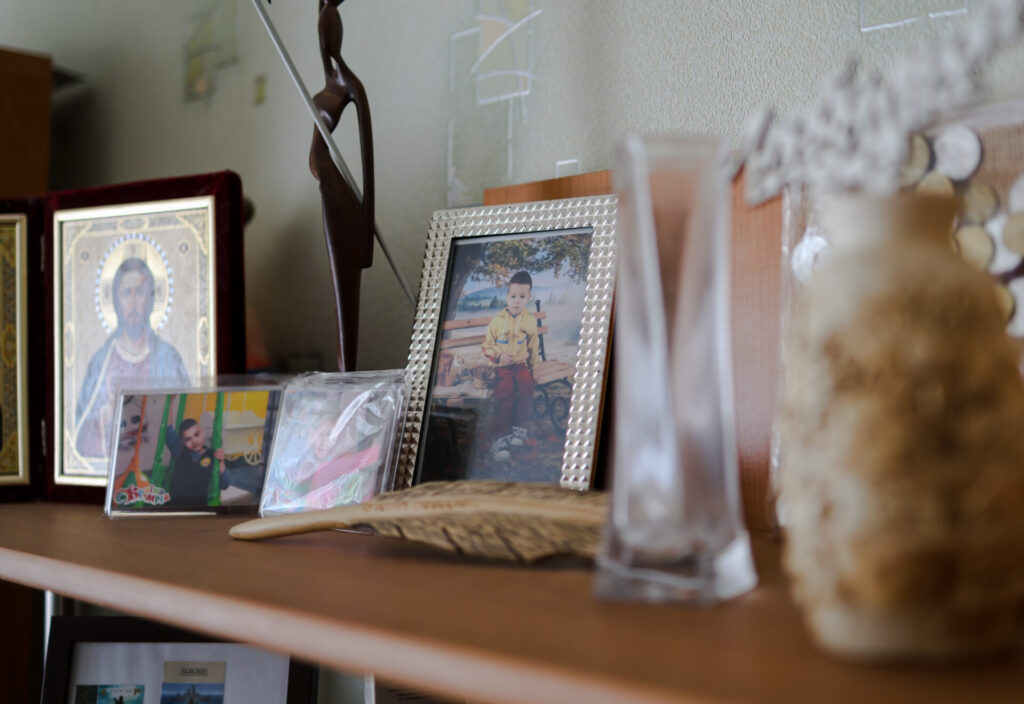
Reutsky worked at the Oleshky school for more than a decade as an educator as well as a coach for the boccia team, a sport similar to lawn bowling except the players maneuver the balls from wheelchairs.
The bonds he made with some of the children and their parents lasted well into their adulthoods or past their academic years. During the occupation, Reutsky was often the main point of communication with parents desperate for updates on their children.
“Almost all the children had relatives who called the children, me and other staff members. But communication under the occupation worsened every day, and at some point we did not have the opportunity to communicate anything to the outside at all,” Reutsky said. In areas under Russian occupation, if there was electricity, Ukrainian cell networks were cut off and often replaced with Russian ones.
Like the other school staff who had stayed during the occupation, Reutsky was opposed to the Russian occupation of his once-peaceful city.
The Ukrainian director of the institution, Tetiana Kniahnytska, persistently declined offers to cooperate with the Russians. But on Oct. 10, the occupation administration replaced her with the newly appointed head of the institution, Vitalii Suk, a local driving school teacher who had sided with the Russians early in the occupation.
On the first day following his appointment, Suk immediately demanded that staff reapply for their jobs under the Russian structure. This would essentially make them all employees of Russia’s occupying regime. Several dozen staff members agreed to live by the new rules — accepting Russian citizenship, recognizing Moscow’s aggression as salvation, rejecting everything Ukrainian — in order to continue taking care of the children. Reutsky staved off the re-application process for as long as he could, still hoping liberation would come before he would have to submit to the Russians.
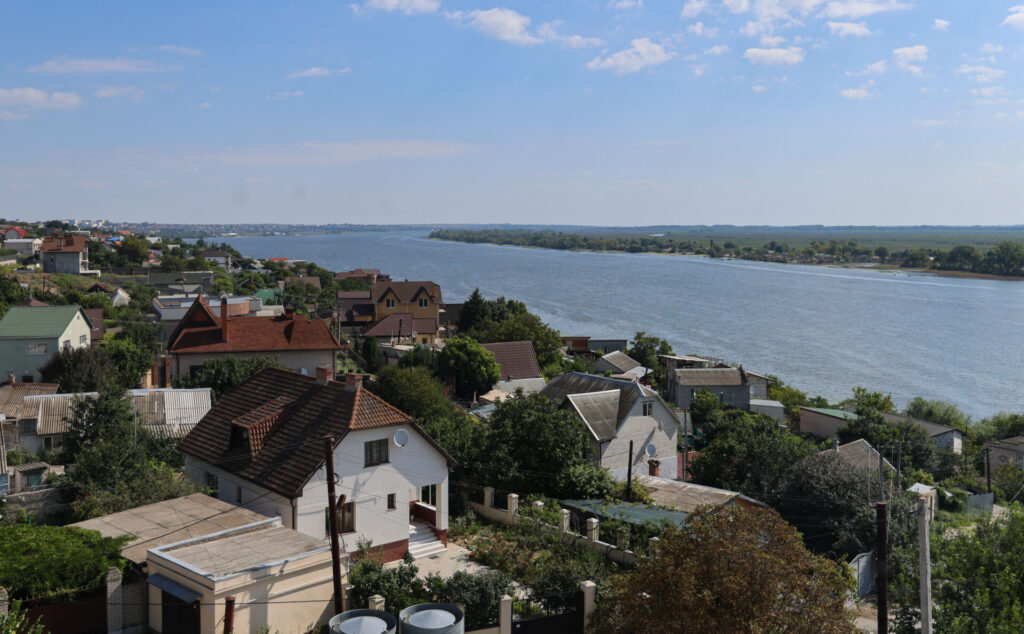
In October 2022, eight months into the occupation, rumors began to spread on social media, and in whispers around town, about the imminent Ukrainian de-occupation of the right bank, where fighting around the regional capital of Kherson had intensified. More worrying were the rumors that the Russians were going to blow up the Kakhovka dam and hydroelectric power station, leading those in Oleshky and the rest of the left bank to fear catastrophic flooding.
Reutsky and the other Oleshky staff worried about the rapid pace with which the Russians were conducting a large-scale campaign of rounding up schools, colleges and social institutions in Kherson and village communities on both sides of the Dnipro River and bussing them out of the region.
Russian occupying forces and Kremlin officials called these “evacuations” to protect the students and residents of the institution from “the danger of shelling by the Ukrainian Armed Forces.”
According to data from the Office of the Prosecutor General of Ukraine, in October 2022, Russia forcibly removed more than 2,000 children from the Kherson region to the occupied territories of the East, Crimea and the Russian Federation. On the left bank of the region, where Oleshky sits, the focus of what Russia called “evacuations” was on social institutions: geriatric and rehabilitation centers and orphanages.
In October 2022, Reutsky said there were at least 85 students left at the school, 35 of whom were part of the adult learning department. Some parents had managed to get their children out themselves during the occupation.
“It was clear that the children would not be left here. If the right side is de-occupied, there will be a front line here. And the children will definitely be taken away,” Reutsky recalled thinking at the time.
Reutsky had the day off on Oct. 21, when he received a call on his cellphone from one of the children at school. The student informed him that preparations were underway for their departure. Reutsky rushed to the school to find about 10 doctors and staff from the psychiatric hospital in Russian-occupied Crimea walking around the institute and observing the children and asking them for first and last names.
At around 1 p.m., the doctors started boarding 16 of the children — all of whom could walk unassisted or with a stroller — onto a large, white tour bus. The bus was accompanied by an escort vehicle resembling a police car.
“In my opinion, they chose these particular ones because they were the simplest, I guess,” Reutsky said. “They took some of the children who walked or used walkers. … They took children who were convenient to take.”
A list of the 16 children removed from the school that day was left on the teacher room’s table. The children ranged in age from 6 to 18. Suk, the Russian-appointed director of the Oleshky school, had signed the list for “evacuation.” According to the document, the children were being transferred to Clinical Psychiatric Hospital No. 5 in Simferopol, the capital of Russian-occupied Crimea.
The remaining children and staff waited at the school, fearful of what the Russians had planned for them.
On the morning of Nov. 4, Reutsky left occupied Oleshky with a small bag and the hope of making his way to Georgia through Russia. As he moved through occupied Ukraine and across the border into Russia, Reutsky got a phone call from one of the Oleshky students. The Russians had just “evacuated” 12 more students from Oleshky.
Though he had no idea about it at the time, the deportations were being orchestrated from the highest levels of the Russian government. Maria Lvova-Belova, the Russian Presidential Commissioner for Children’s Rights, was in the region of Kherson’s left bank in October and November, where the occupying forces were nervously watching the rapid Ukrainian approach. On Nov. 11, the official Telegram channels of the occupying authorities wrote that Lvova-Belova, who has since been indicted by the International Criminal Court for the forcible deportation of Ukrainian children, instructed the remaining students at the Oleshky boarding school to move to Skadovsk, another occupied small city on the shores of the Black Sea.
After Lvova-Belova made a request to the Ministry of Health in Russia, “they promptly responded, providing 14 ambulances for the evacuation of the children from Oleshky,” a statement read, adding that local official Alla Barkhatnova, the acting Minister of Social Policy and Labor for Kherson Region, took part in the decision. That same day, 56 disabled children and adults were transported by ambulances to the Nadiia Rehabilitation Centre in Skadovsk.
At times, Russian propaganda celebrated the removal of the Ukrainian children. “We do not ignore the children’s social institutions that were evacuated,” a Russian parliament member, Igor Kastyukevich, bragged on his Telegram messaging channel less than a month later. The politician’s post included photos of “volunteers of the United Russia Humanitarian Mission” delivering diapers and food to the Skadovsk facility, which was by then housing the Oleshky boarding school students.
For the Russians, the deportation of disabled people was a propaganda opportunity, to show off their munificence. In reality, the disabled residents of Oleshky were being held in poor conditions. The Skadovsk center was a two-story building that lacked the necessary equipment to adequately cater to the Oleshky children’s special needs.
The longer they are on Russian-controlled territory, the more the Oleshky residents will be subjected to Russian-enforced indoctrination that looks to eradicate the independent Ukrainian identity. Human rights organizations and Ukrainian officials have decried these actions as part of a broader campaign to erase Ukrainian culture and sever the next generation’s ties to their homeland. This forced assimilation has been described as a potential war crime by international observers.
When four of the students were deported to the Russian village of Noviye Berega in the western Penza region, another propaganda opportunity arose. The children had been moved to a special residential village designed for people with disabilities. On Nov. 23, 2023, local state news described their joy in glowing language: “They have only spent five days here … but have already learned to love all that surrounds them.” The village they were staying in had been built by Lvova-Belova’s sister, Sophia. While Maria Lvova-Belova oversees deportations, her sister receives government funds to open orphanages.
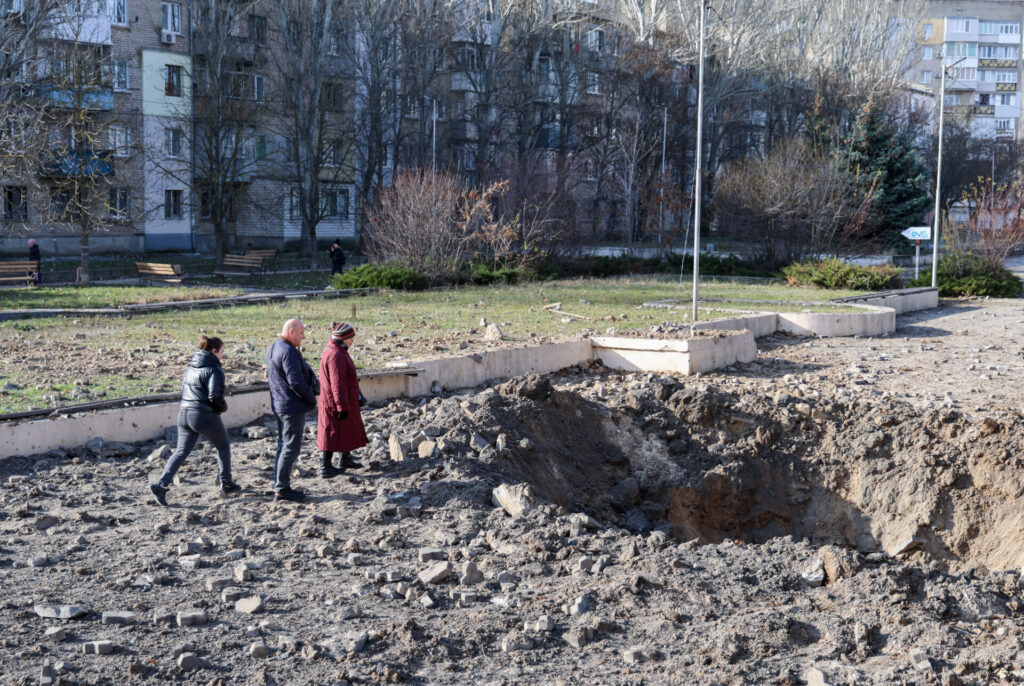
In early 2024, a year and a half after the Russians deported the residents of the Oleshky school, someone sent Reutsky a link to a Telegram post with an embedded video. In the video, a Russian soldier held up a rudimentary drawing from a child. The drawing was of primitive sketches of shapes but what was clear were the letters Z, V and O — used by the Russian army as symbols of their war against Ukraine. “Come back home alive” was written in childlike script.
As the Russian soldier held up the drawing with both hands for the camera, he thanked the child, whose name, Oleksandr, was written on the back of the paper, adding that the child was from the Oleshky orphanage.
The image of the soldier thanking Oleksandr for the drawing broke Reutsky’s heart. Oleksandr was one of his students and the coach knew he could not write or draw. “Of course, one of the teachers drew it and signed it on behalf of the children,” he surmised.
Angry and saddened, Reutsky took to Facebook. “Using children for propaganda is not just low, it is a violation of our rights,” he wrote in a post that day.
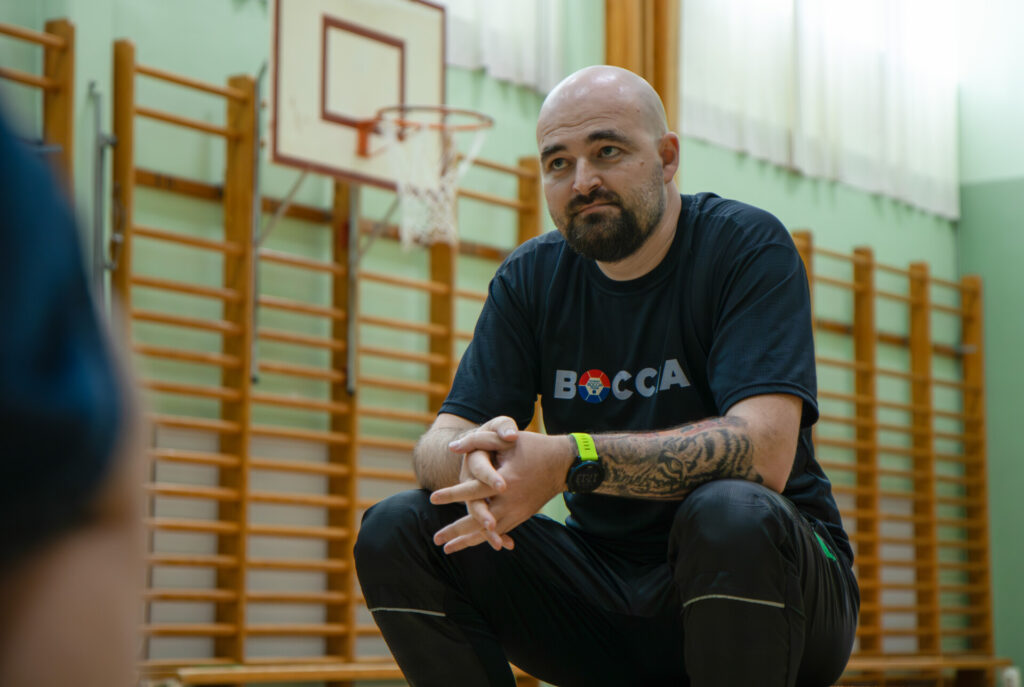
In early February 2024, almost exactly two years after Russia invaded, an international coalition for the return of Ukrainian children was established. Managed by the Ukrainian and Canadian governments and set up by President Volodymyr Zelenskyy, “Bring Kids Back” has returned several hundred children who were forcibly deported to Russia, using mediators such as Qatar, and enlisting the help of a team of international legal experts, including from the British government and the U.N.
A major hurdle in bringing back minors is Russia’s demand that they be returned only to blood relatives. In the Oleshky orphanage, more than half of the pupils are without parental care, meaning their relatives need to be found before Russia will agree to release them. Complicating things further, finding relatives who are themselves fit enough to care for the children is often extremely challenging, as is locating a Ukrainian state institution responsible for protecting the best interests of these children.
While the Russian occupying administration insists that their appointed director, Suk, is in charge of the Oleshky boarding school, Ukraine appointed its own director two years after the “evacuations” in order to have a representative for the children’s interests.
In February 2023, all Oleshky children from orphanages in Russia were moved to occupied Skadovsk, which, after the de-occupation of Kherson, became the makeshift capital of the occupied region. Children from various institutions in Crimea were also relocated there.
Meanwhile, Ukrainian workers who remained in Oleshky reported that the orphanage building had been stripped of everything from carpets and curtains to valuable medical equipment.
“They took everything and left bare walls,” said Natalka Hrabovska, a former staff member at the school.
In the weeks and months following their deportation from Oleshky, the Russians separated and shuttled the disabled children to various locations in both the occupied territories of Ukraine and Russia itself. Their locations were shrouded in confusion, making it difficult for their parents, guardians and school staff to track them. But that didn’t stop them from doing all they could to find and return the lost disabled residents of Oleshky.
Aurora, then 13, had her own cellphone and could call her mother, Maria, almost every day during the occupation (both of their names have been changed at their request to protect their identities). The mother and daughter were close; they would chat about Aurora’s new friends at school and learn updates about relatives back home. Maria struggled to care on her own for Aurora, who has a mild learning disability and is confined to a wheelchair, and placed her in Oleshky when she was small.
On Oct. 21, 2022, Aurora called her mother in a panic. Doctors from Crimea had come to the Oleshky school and were loading some of the children onto a bus, she frantically told her mother.
“Mom, they wanted to take me, but the nannies ‘fought’ for me,” she told Maria, explaining how the school’s caregivers had pleaded with the Russian doctors to leave the chair-bound girl. “But Sonya and Karina were taken.”
The Crimean doctors took Aurora in the second round of evacuations on Nov. 4, which Maria would learn about on the following day.
Maria tracked down Vitalii Suk, the Russian-appointed director of the Oleshky school, on his mobile and demanded answers. “By then, I already knew they had taken one group of children first, and then my Aurora,” Maria said. Suk told Maria the decision to take Aurora from Oleshky came from “instructions ‘from higher-ups.’”
“They gave her clothes and food for five days. I don’t know what documents they brought with them,” he told Maria.
By November 2022, Oleshky’s pupils were scattered across Russia, occupied Crimea and Skadovsk. In addition to those taken to Russian orphanages, some were taken to orphanages in Crimea.
Meanwhile, Aurora’s mother was on her way to Crimea from the free part of Ukraine. She had to travel more than 6,000 miles to reach her daughter, passing through Poland, Latvia, Lithuania and the western part of Russia.
At the hospital, Maria found the staff assigned to care for her daughter reluctant to return her child. Before bringing Aurora to her mother, they insisted Maria sign a statement that she had no complaints against the hospital and that the girl had no bruises.
When Maria finally saw her daughter, she was shocked by Aurora’s condition. She was dressed in dirty clothes and her frail body had a strong, unpleasant odor, her mother said. Aurora later revealed that during her three weeks at the hospital, she never brushed her teeth or took a shower. She spoke about being beaten by medical staff and how much she missed her friends. Maria faced a major problem with the lack of medical documents, as the Crimean hospital did not return most of her daughter’s personal file containing her entire medical history from the past seven years. Initially, the hospital staff refused to give back the child’s wheelchair, claiming it belonged to the Oleshky orphanage.
When the mother and child tried to cross Russia’s southern border into Georgia, Maria and Aurora were detained by Russian border guards, who couldn’t understand how the child ended up in Russia without any documentation of her crossing the border.
“How did you manage to get her into Russia without her migration card?” the guards asked her. “How did the child end up here?”
“I have the same question,” Maria retorted. “The child was living in an orphanage, sleeping in her own bed, and one day she woke up and there was a referendum. And now it’s ‘Russia.’ Then doctors came, took her away from there, and brought her to Simferopol.”
The border guards told her it was illegal for the child to enter the country as she did.
“You mean to say that the child is here illegally, that the Russians took her here?” Maria argued with them.
As Aurora lay in the open air in the back of the truck that had gotten them this far, Maria stood for hours in the cold Caucasus mountain air and repeatedly explained the situation to the border guards.
Finally, the guard offered Maria a way out of the back-and-forth. “You mean the child was rescued and evacuated?”
Maria relented. Yes, rescued, she told them. “I lied as much as I could. What else can you do?”
The Russians finally let them cross. When they reached the next border, the Georgians looked at the documents and said, “We know all about the situation.” Then they offered Maria and Aurora a cup of hot tea.
It was just one step in their long journey home to Ukraine.
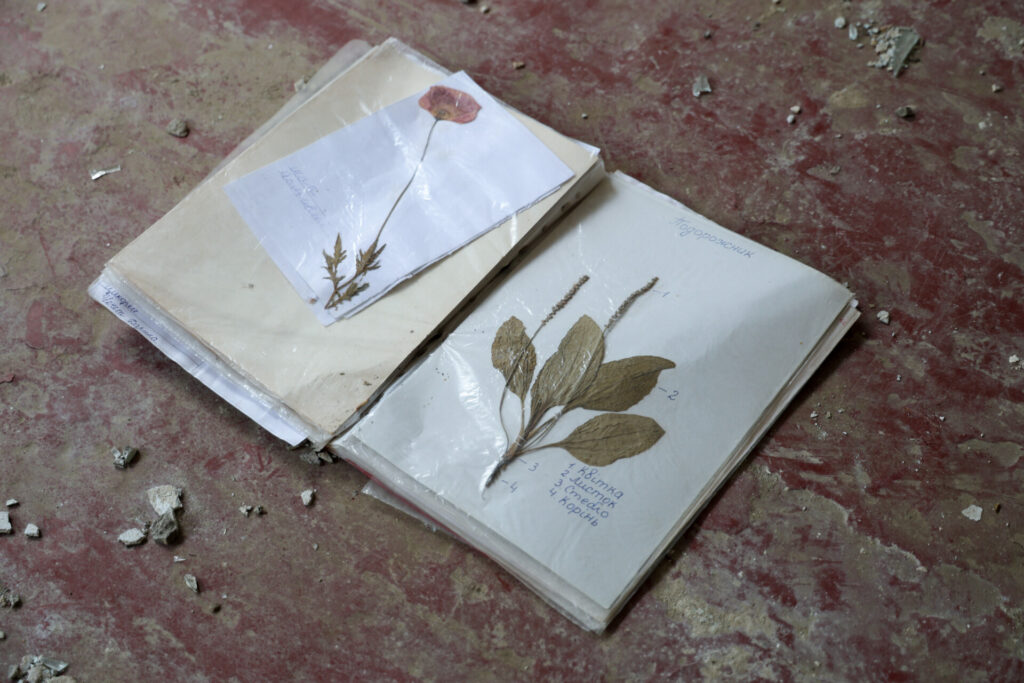
The day after the Russians took the second group of Oleshky children away in buses, the Russian occupation authorities overseeing the school sent out a text message to some of the students’ parents to inform them that the school had been “evacuated.” Artem Parakonnyi’s mother received the message on Nov. 5. None of the children were named but Artem’s grandmother, Nina Medynska, wasn’t taking any chances.
The next day, Medynska decided to get to Oleshky and look for her 16-year-old grandson herself. She found a boat to take her over the Dnipro River, then the only means of transportation available, and headed for Oleshky. Medynska did not know at the time that she had managed to get on the last boat from Kherson to the left bank of the Dnipro. She would not return home for another five months.
Parakonnyi was diagnosed with a neurological disease and developmental disability at the age of 5. When he was 12, his family put him in the Oleshky school, where he thrived. Before the full-scale war, Medynska could get from where she lived in the suburbs of Kherson city to Oleshky in 20 minutes, which allowed her to regularly visit and bring him home for short stays.
During the Russian occupation of Kherson, which fell within the first 72 hours of the invasion, Medynska and her family set up a shelter in their basement to protect themselves from shelling. There was no safe way to retrieve Parakonnyi from Oleshky, so the family decided to keep him there. Like Anton Volkovych’s mother, Medynska relied on updates from the school staff caring for Parakonnyi in occupied Oleshky.
In Oleshky, Medynska learned from a school staff member that her grandson had been with the children who were taken to Crimea on Oct. 21, the first round of Russian “evacuations.” The school staff believed that the group had been transported later to the Nadiia Rehabilitation Center in Skadovsk.
Medynska headed to Skadovsk, 50 miles south of Oleshky. She was too late. In Skadovsk, Medynska learned that her grandson was already in Russia. The first 16 students taken by bus to Crimea on Oct. 21 were almost immediately sent to orphanages in Russia. Out of the second group of evacuated students, Parakonnyi ended up in the city of Kropotkin, about 90 miles from the southern Russian city of Krasnodar. She was sure her grandson didn’t even appreciate the full danger of what it meant to be in Russia. “These children really don’t understand. They were told they are leaving, and that’s it,” she said.
Determined to bring her grandson home, Medynska stayed in Skadovsk on the Black Sea and used all her energy and resources to track him down. On Feb. 2, 2023, Parakonnyi and several other Oleshky students were returned from Russia to occupied Skadovsk. But Suk, the director of the boarding school appointed by the occupation authorities, refused to return the boy to his grandmother. Her persistence irritated Suk to the point that he threatened to throw Medynska into one of the Russian occupying regime’s notorious basement prisons, she said.
Finally, after weeks of bureaucratic hurdles and paperwork to establish herself as Parakonnyi’s legal guardian, Suk finally relinquished the teenager to his grandmother on March 27, nearly four months after he was taken by the Russians without consent. The newly appointed management of the boarding school issued the boy a Russian passport, which his grandmother refused to accept.
On March 28, Medynska and Parakonnyi started to make their way home to Kherson. By that time, the city had been liberated by Ukrainian forces and Medynska was eager to get the boy back to his family, despite the dangers of drones and shelling in the southern front of the war.
As the pair passed through a Russian filtration camp in Dzhankoy, Crimea, Medynska described a horrific scene of harassment and stress.
“They shout at the children, the children are frightened: ‘What is your mother’s name?! What is your last name?!’ The child cannot understand what they want from him,” she said. Those attempting to cross whose passports showed they had been to Europe, the Kremlin’s enemy, were treated harshly; some were forced to strip naked, she said.
In order to get to Kherson, Medynska and Parakonnyi needed to travel through Russian-occupied territory, pass over the Russian border, then make their way through Belarus and Russia before finally crossing into Ukraine. It took weeks. Before the Russian invasion, the same trip would have taken less than two hours.
For the boy, the journey was quite difficult, as his physical and psychological condition make it difficult for him to travel for long stints.
“When we arrived home with him, his condition was very serious. He pushed us, scratched himself and banged his head against the wall. The child’s mental disorder was so severe,” Medynska said.
Even through his speech impediment, his relatives understood from certain phrases he used that he was subjected to physical violence in the Russian children’s institution in Kropotkin.
Parakonnyi turned 18 this year. He now lives with his mother, grandmother and sister in an area of the city of Kherson that is shelled constantly by the Russian army stationed just over the Dnipro River.
Living in their region of Kherson has risks — the shelling disturbs him and makes him cry — but the boy is home with his family, his grandmother said. “He is still better here at home, because we have our own house with a yard, and he needs space.”
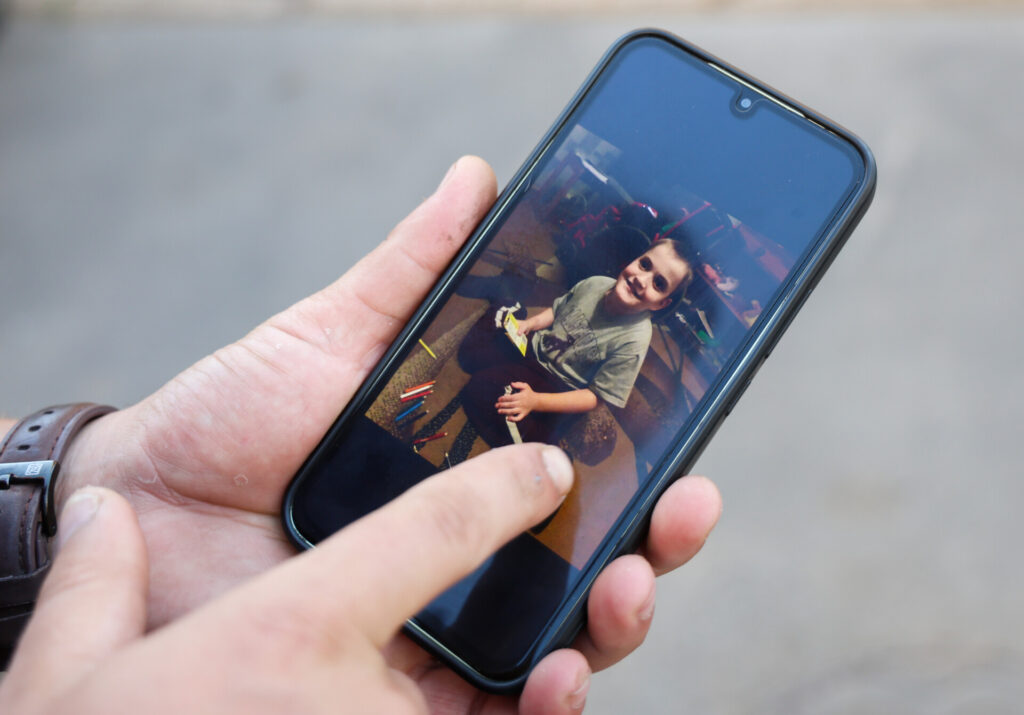
Heorhiy Burskyi was removed from parental care as a toddler after the Ukrainian social services declared his mother unfit to care for him because she has infantile cerebral palsy. Gosha, as Burskyi is known, is developmentally disabled and has a rare form of bone atrophy that requires him to use a wheelchair or walker. He entered the Oleshky school when he was 5. He was 13 when the invasion started.
Petro Yenyushin, Gosha’s oldest brother, said he and his siblings grew up in various state-run institutions for most of their lives. The first time he met Gosha was when he was around 2 years old, but after that, he tried to keep close tabs on his younger brother. Before the war, Yenyushin visited his younger brother in Kyiv when Gosha came from Oleshky for treatment at a special institute in the capital. Yenyushin presented Gosha with a cellphone so the brothers could stay in touch.
During the occupation, Gosha called Yenyushin frequently. He told his older brother how scared all the children were while sheltering in the school’s cramped basement at the beginning of the invasion. Reutsky called Yenyushin frequently, too, to update him on the situation in the Oleshky school and with Gosha in particular. While Reutsky loved all the children and adults at the school, he confessed that Gosha was one of his favorites. And the boy reciprocated with his admiration of the warm-hearted boccia coach. In conversations with his older brother, Gosha often referred to Reutsky as “dad.”
In the first months of the occupation of Oleshky, Yenyushin explored the possibilities of how to get his younger brother out of Oleshky, but none of them seemed feasible.
In April 2022, communication between Yenyushin and Gosha abruptly ended.
The Russians removed Gosha from the Oleshky school with the first group of children on Oct. 21, 2022, and transported him by bus to the Clinical Psychiatric Hospital No. 5 in the Crimean city of Simferopol. At the time, the boy was 14 years old. Several employees of the boarding school recognized him in the video from occupied Skadovsk and believe Gosha is currently there.
Yenyushin submitted a statement to the Office of the Commissioner for Human Rights of Ukraine and subsequently appealed to the guardianship service. He now has legal custody of his brother, but the Office of the Ombudsman has advised him to be patient.
“The process of returning a child with a disability takes time,” he was told.
Yenyushin remains deeply concerned about his brother. “It is crucial for me to bring [Gosha] back because, firstly, he is my family, and secondly, he needs round-the-clock, high-quality medical care, which was previously provided to him in Oleshky,” Yenyushin said.
As of September of this year, nine minors are known to have been returned, six of whom were retrieved by their relatives without the involvement of Ukrainian state authorities. One adult female student was also returned, making the total returned Oleshky students 10 out of the 84 taken by the Russians. Out of all 10 Oleshky students returned, three children were returned with the participation of the Ukrainian government. This is the only known case of an adult student being returned from state institutions under occupation. It is also known that at least six children died during the occupation, including one boy in January 2023. Reutsky claims that the child had a heart defect. He was scheduled for an operation in Ukraine, but this didn’t happen due to the Russians taking him. He believes the Russians did not perform the operation on the child, or he would most likely still be alive.
Currently, he can only guess about the condition and location of the children from the messages of the Russians on social networks. Most likely, most of the students are in occupied Skadovsk.
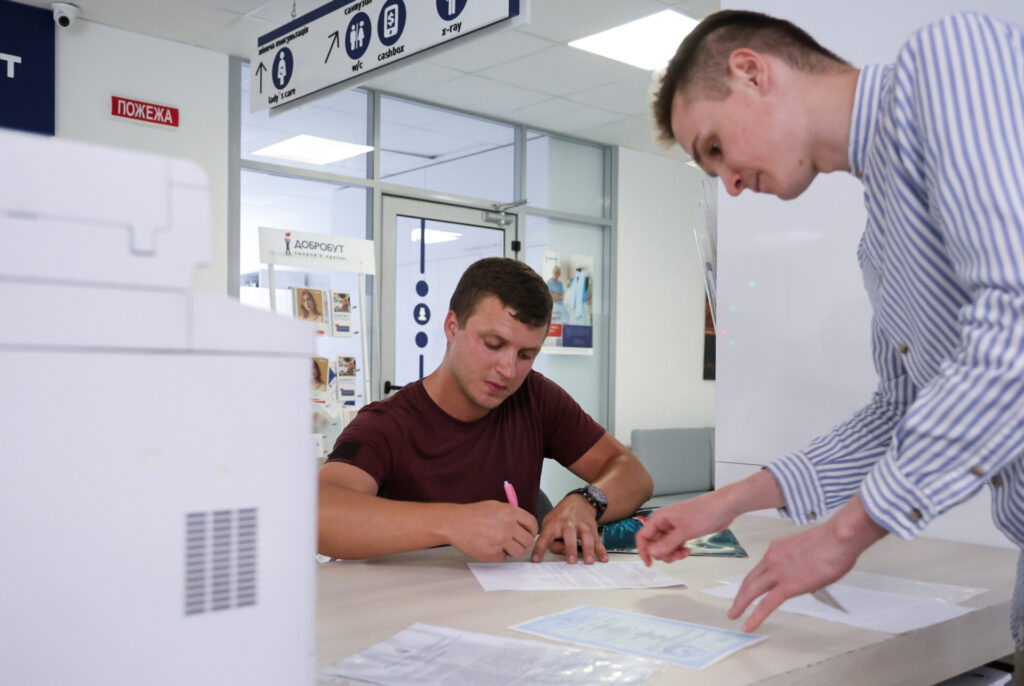
Reutsky now lives outside Ukraine, elsewhere in Europe. He still worries constantly about the students he once spent his days with at the Oleshky school. Every time he reads about another one of Ukraine’s stolen children returning from Russia’s grip, he scans for the name and hopes it’s one of the children from Oleshky.
In August 2024, his phone suddenly buzzed with a message from one of the Oleshky students in Russian-occupied territory. Reutsky could hardly believe it — he hadn’t spoken with him for over a year. He called back and, during the conversation, Reutsky tried to learn as much as possible about the students in Russian so-called care, while being careful not to ask anything that would provoke the student, who has a severe mental illness, from saying anything so anti-Russian it would get him in trouble if the call were being monitored. As they talked, Reutsky learned of some worrying news. One student was so upset he had taken to smashing windows and was now about to be sent to a psychiatric ward. The other students were being fed less frequently than in Ukraine. Relatives who had tried to recover family members under Russian occupation had been turned back at checkpoints. After half an hour, the call was cut off.
It was a rare moment of contact with his students. For the moment, Reutsky learned, they still remembered and missed their common picnics and how they drank tea together. But how much longer would it be before those bonds were broken?
Gosha’s brother Petro Yenushin has the same worries. Will Gosha even remember him when — and if — they meet? “The other side doesn’t want to return him. They don’t care about any international laws.”
Reporting for this story was based on witness testimonies and research collected by journalists with The Reckoning Project.
Sign up to our mailing list to receive our stories in your inbox.





